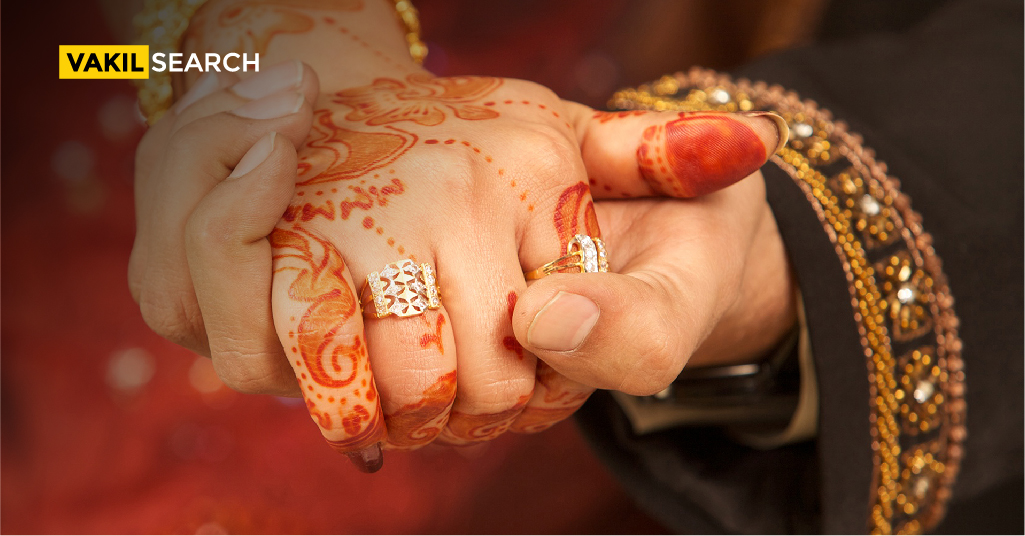Irrespective of the rituals followed during the marriage, one can register their marriage under the Special Marriages Act, by following the procedure below.
For many purposes, (legal formalities, in particular) you might need to do marriage registration under the Special Marriage Act. The conditions for marriage solemnization under this act differ in certain aspects when compared to personal laws of religion.
Conditions for Marriage Registration Under the Special Marriage Act
(a) a ceremony of marriage has been performed between the parties and they have been living together as husband and wife ever since;
(b) neither party has more than one spouse living at the time of registration;
(c) neither party is an idiot or a lunatic at the time of registration;
(d) the parties have completed the age of twenty-one years at the time of registration;
(e) the parties are not within the degrees of prohibited relationship;
(f) the parties have been residing within the district of the Marriage Officer, to whom the application is made for registration of the marriage, for a minimum period of thirty days immediately prior to the date on which the application is made.
Procedure for Marriage Registration Under the Special Marriage Act
The parties to the marriage are required to submit an application https://services.india.gov.in/service signed by both of them to the Marriage Officer concerned, along with a marriage affidavit. The Officer will then proceed to give public notice of the application in the prescribed manner. After allowing a period of thirty days for objection, the marriage Officer, if satisfied, will enter a certificate of the marriage in the Marriage Certificate Book, which shall be signed by the parties to the marriage and three witnesses.
From the date of such entry of the online marriage certificate registration, the Marriage will be deemed to be solemnized under the Special Marriage Act. If the Marriage Officer refuses registration, either party may appeal to the District Court of the district in which the office of the Marriage Officer is situated within 30 days of refusal by the Marriage Officer.
Consequences of Marriage Solemnized Under Special Marriage Act
Any member of an undivided family who professes the Hindu, Buddhist, Sikh, or Jain religion marrying under the Special Marriage Act shall be deemed to affect their severance from the family. Succession to the property of any person marrying under this Act as well as the descendants of such person shall be governed by the provisions of the Indian Succession Act, 1925.
However, these rules will not be applicable in case of marriages between a person who professes the Hindu, Buddhist, Sikh, or Jain religion with a person who professes the Hindu, Buddhist, Sikh, or Jain religion.
FAQs
Is there a specific timeframe within which the marriage should be registered after the ceremony under the Special Marriage Act?
Yes, according to the Special Marriage Act, couples are required to serve a notice with relevant documents to the Marriage Officer at least 30 days before the intended date of the marriage.
Can non-residents or individuals from different states register their marriage under this Act?
Yes, the Special Marriage Act allows individuals from different states or non-residents to register their marriage, provided they fulfil the eligibility criteria and follow the specified process.
How does the Special Marriage Act address inter-faith or inter-caste marriages?
The Special Marriage Act is designed to facilitate inter-faith or inter-caste marriages. It allows individuals from different religious backgrounds to solemnize and register their marriage under this Act.
What role do witnesses play in the marriage registration process under the Special Marriage Act?
Witnesses play a crucial role in the marriage registration process by attesting to the marriage and providing credibility and relationship proof to the parties.
What happens if there are objections to the marriage, and how are disputes or challenges resolved?
If there are objections to the marriage, a 30-day waiting period is required during which objections may be raised. The Marriage Officer will investigate the objections, and if found invalid, the marriage can be solemnized. Disputes or challenges are resolved through the legal process as per the provisions of the Special Marriage Act

